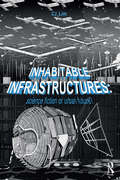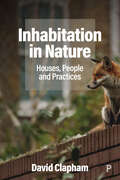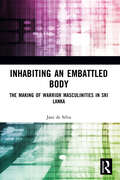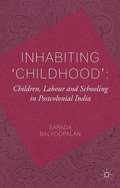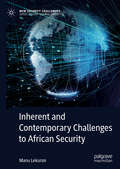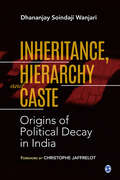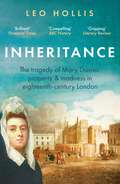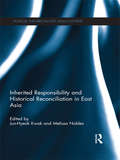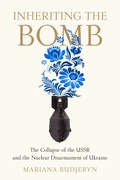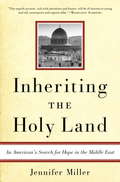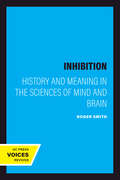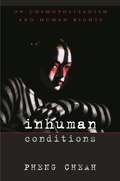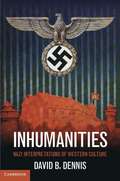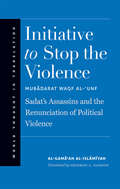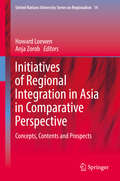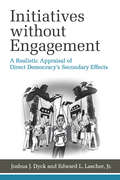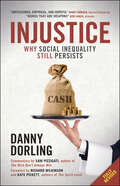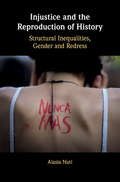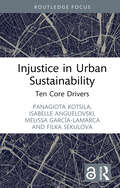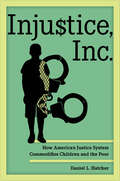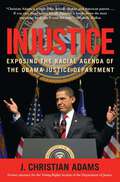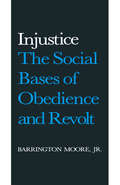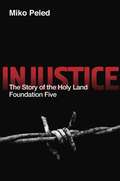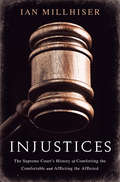- Table View
- List View
Inhabitable Infrastructures: Science fiction or urban future?
by CJ LimInhabitable Infrastructures: Science fiction or urban future?, the follow up to Food City and Smartcities and Eco-Warriors, from one of the world’s leading urban design and architectural thinkers, explores the potential of climate change-related multi-use infrastructures that address the fundamental human requirements to protect, to provide and to participate. The stimulus for the infrastructures derives from postulated scenarios and processes gleaned from science fiction and futurology as well as the current body of scientific knowledge regarding changing environmental impacts on cities. Science fiction is interdisciplinary by nature, aggregates the past and present, and evaluates both lay opinions and professional strategies in an attempt to develop foresight and to map possible futures. The research culminates in the creation of innovative multi-use infrastructures and integrated self-sustaining support systems that meet the challenges posed through climate change and overpopulation, and the reciprocal benefits of simultaneously addressing the threat and the shaping of cities. J. G. Ballard has written that the psychological realm of science fiction is most valuable in its predictive function, and in projecting emotions into the future. The knowledge from the book is widely transferable, constituting both solutions and speculative visions of future urban environments. The book is indispensable reading for professionals and students in the fields of urban design, architecture, engineering and environmental socio-politics.
Inhabitation in Nature: Houses, People and Practices
by David ClaphamRejecting the assumption that housing and cities are separate from nature, David Clapham advances a new research framework that integrates housing with the rest of the natural world. Demonstrating the wider context of human lives and the impact of housing on the non-human environment, the author considers the impact of current inhabitation practices on climate change and biodiversity. Showcasing the significant contribution that housing policy can make in mitigating environmental problems, this book will stimulate debate amongst housing researchers and policy makers.
Inhabiting an Embattled Body: The Making of Warrior Masculinities in Sri Lanka
by Jani de SilvaThis book offers an anthropological account of Sri Lanka’s Eelam Wars III and IV. It is based on the life-narratives of ex-servicemen who fought on the frontlines. The volume approaches militarism as a practice of masculinity. It explores the sense of embattlement that young recruits feel, which stems from the inner war between notions of bodily deference instilled in childhood and having to conduct offensives on the battlefield. Thus though they wish to move smoothly into the assault techniques learnt in combat-training, they sometimes find their bodies are acting-out a different trajectory; engaging in acts of spectacular violence or simply running away. It traverses themes such as masculinity and Sinhala society, British martial masculinity vs the composed body in Sinhala discourse, combat-training and the battlefield. The author traces the ways in which troops tried to negotiate the thin line between valour and violence in a context in which the enemy’s suicide fighters engaged in the more extreme code of sacrificing-the-body, which derided the very manliness of soldiers who couldn’t prevail against them. She argues that the Sri Lankan experience has resonance for soldiers on battlefields everywhere, who become embattled when confronted by adversaries whose practice seems to diminish their own manliness. Rich in ethnographical narratives, this book will be interest scholars and researchers of war studies, gender studies, masculinity studies, peace and conflict studies, ethnic studies, political science, international relations, sociology, social anthropology, cultural studies, and South Asian studies, especially those concerned with Sri Lanka.
Inhabiting ‘Childhood’
by Sarada BalagopalanThrough a rich ethnography of street and working children in Calcutta, India, this book offers the first sustained enquiry into postcolonial childhoods, arguing that the lingering effects of colonialism are central to comprehending why these children struggle to inhabit the transition from labour to schooling.
Inherent and Contemporary Challenges to African Security (New Security Challenges)
by Manu LekunzeThis book presents a unique, comprehensive yet accessible look at security in Africa. The author provides a comprehensive review of the key security issues in Africa and offers a contemporary investigation into what security in Africa will mean for the future of Security Studies. It focuses on contemporary yet inherent security challenges facing the continent. It engages with International Relation theories, security literature and primary data from Cameroon (related to other African case studies), to situate African Security Studies in International Relations and develop a concept of security for African Security Studies. It will be essential reading for students, analysts and policy makers specializing in International Relations, Sociology, African Studies and Development Studies.
Inheritance, Hierarchy and Caste: Origins of Political Decay in India
by Dhananjay Soindaji WanjariThe growing power of business and the increasing rhetoric of the cultural–religious ideology of Hindutva have been the focus of the recent scholarly ventures seeking to explain the persistent undemocratic tendencies in India. The book argues that this traditional and pervasive analytical framework has failed to unravel the deep-rooted societal causes of the growing degeneration in political institutions. What is missed out is the increasing concentration of power in the hands of the hereditary governing class. Inheritance, Hierarchy and Caste: Origins of Political Decay in India shows how the elite-pursuit for controlling societal power, retaining hierarchy and perpetuating inheritance is making use of ideology and, thereby, undermining the democratic spirit in India and reshaping the state itself. The book underlines the realistic significance of the effective representation of the governed classes and analyses how it is critical for bringing pragmatism to the relation between the institutional and functional aspects of the democratic consolidation in India.
Inheritance: A Psychological History of the Royal Family
by Dennis FriedmanIn exploring Royal dynamics, Inheritance sheds light on problems found in any familyOn its first publication in the 1990s, Dennis Friedman's Inheritance caused a furor in England as he traced the many problems of the Royal family as it was then back to Queen Victoria's nursery, unveiling a host of psychodramas played out against a privileged background of English palaces and Scottish castles. In a post-Diana age, the arrival of a new Prince George to the seemingly stable and blissfully happy William and Kate seems to refute Fiedman's thesis--but what of the notoriously wayward Prince Harry? Many questions are raised in this book addressing the complex and turbulent royal relationships, perhaps the most fundamental being the rigid and traditional royal upbringing which still awaits the baby prince. As the royal line is followed down the generations no direct descendent is overlooked and no issue is sidestepped.
Inheritance: A Story of Property, Marriage and Madness
by Leo Hollis&‘Hollis expertly weaves together the human tragedy and high politics behind the explosion of one of the world&’s greatest cities.&’ Dan Snow In June 1701, a young widow, Mary Davies wakes up in a hotel room in Paris and finds a man in her bed. Within hours they are married. Yet three weeks later, Mary fled to London and swore that she had never agreed to the wedding. So begins one of the most intriguing stories of madness, tragic passions and the curse of inheritance. Inheritance charts the forgotten life of Mary Davies, born in London during the Great Plague of 1665, and the land that she inherited as a baby. This estate would determine the course of her tragic life. Hollis restores this history of child brides, mad heiresses, religious controversy and shady dealing. The drama culminated in a court case that determined not just the state of Mary&’s legacy, but the future of London itself. Today, Mary&’s inheritance is some of the most valuable real estate in the world.
Inherited Responsibility and Historical Reconciliation in East Asia (Political Theories in East Asian Context)
by Jun-Hyeok Kwak and Melissa NoblesContemporary East Asian societies are still struggling with complex legacies of colonialism, war and domination. Years of Japanese imperial occupation followed by the Cold War have entrenched competing historical understandings of responsibility for past crimes in Korea, China, Japan and elsewhere in the region. In this context, even the impressive economic and cultural networks that have developed over the past sixty years have failed to secure peaceful coexistence and overcome lingering attitudes of distrust and misunderstanding in the region. This book examines the challenges of historical reconciliation in East Asia, and, in doing so, calls for a reimagining of how we understand both historical identity and responsibility. It suggests that by adopting a ‘forward-looking’ approach that eschews obsession with the past, in favour of a reflective and deliberative engagement with history, real progress can be made towards peaceful coexistence in East Asia. With chapters that focus on select experiences from East Asia, while simultaneously situating them within a wider comparative perspective, the contributors to this volume focus on the close relationship between reconciliation and ‘inherited responsibility’ and reveal the contested nature of both concepts. Finally, this volume suggests that historical reconciliation is essential for strengthening mutual trust between the states and people of East Asia, and suggests ways in which such divisive legacies of conflict can be overcome. Providing both an overview of the theoretical arguments surrounding reconciliation and inherited responsibility, alongside examples of these concepts from across East Asia, this book will be valuable to students and scholars interested in Asian politics, Asian history and international relations more broadly.
Inheriting the Bomb: The Collapse of the USSR and the Nuclear Disarmament of Ukraine (Johns Hopkins Nuclear History and Contemporary Affairs)
by Mariana BudjerynThe collapse of the Soviet Union unleashed the specter of the largest wave of nuclear proliferation in history. Why did Ukraine ultimately choose the path of nuclear disarmament?The collapse of the Soviet Union in 1991 left its nearly 30,000 nuclear weapons spread over the territories of four newly sovereign states: Belarus, Kazakhstan, the Russian Federation, and Ukraine. This collapse cast a shadow of profound ambiguity over the fate of the world's largest arsenal of the deadliest weapons ever created. In Inheriting the Bomb, Mariana Budjeryn reexamines the history of nuclear predicament caused by the Soviet collapse and the subsequent nuclear disarmament of the non-Russian Soviet successor states.Although Belarus and Kazakhstan renounced their claim to Soviet nuclear weapons, Ukraine proved to be a difficult case: with its demand for recognition as a lawful successor state of the USSR, a nuclear superpower, the country became a major proliferation concern. And yet by 1994, Ukraine had acceded to the Treaty on the Non-proliferation of Nuclear Weapons (NPT) as a non-nuclear-weapon state and proceeded to transfer its nuclear warheads to Russia, which emerged as the sole nuclear successor of the USSR. How was this international proliferation crisis averted? Drawing on extensive archival research in the former Soviet Union and the United States, Budjeryn uncovers a fuller and more nuanced narrative of post-Soviet denuclearization. She reconstructs Ukraine's path to nuclear disarmament to understand how its leaders made sense of the nuclear armaments their country inherited. Among the various factors that contributed to Ukraine's nuclear renunciation, including diplomatic pressure from the United States and Russia and domestic economic woes, the NPT stands out as a salient force that provided an international framework for managing the Soviet nuclear collapse.
Inheriting the Holy Land: An American's Search for Hope in the Middle East
by Jennifer MillerWriting with fierce honesty, Jennifer Miller has created an extraordinary synthesis of history, reportage, and coming-of-age memoir in Inheriting the Holy Land. Her groundbreaking perspective on the conflict is presented through interviews with young Israelis and Palestinians and conversations with some of the most influential officials involved in the Middle East, including Shimon Peres, Yasir Arafat, James Baker, Benjamin Netanyahu, Colin Powell, Ehud Barak, and Mahmoud Abbas. This book will open eyes, open hearts, and open minds. Miller grew up in an affluent suburb of Washington, D.C., surrounded by the chaotic politics of the Middle East. Her father was a U.S. State Department negotiator at the Oslo and Camp David peace summits, and dinnertime conversation in the Miller household often included discussions of the Middle Eastern conflict. When Miller joined Seeds of Peace, a program that brings Middle Eastern kids to Maine for intensive sessions of conflict resolution, her real experience with the Middle East began. As she befriended young Palestinians, Israelis, Egyptians, and Jordanians, Jennifer came to realize that their views were missing from the ongoing debate over the Holy Land. By helping these young voices be heard, she knew she could reveal something vitally new and deeply challenging about the future of this torn region. Miller, however, learned fast that it was one thing to hang out at the idyllic Seeds for Peace camp in Maine and quite another to confront young people on their own turf-in the alleys of East Jerusalem, behind the armed gates of West Bank settlements, in the teeming refugee camps of Gaza. Friendships that had blossomed in the United States withered in the aftermath of yet another suicide bombing. Big-hearted teens on both sides of the conflict shocked Miller with the ferocity of their illusions and the twisted logic of their misconceptions. But she also found rays of hope in places where others had reported only despair--surprising open-mindedness among the ultra-religious, common ground shared by those who had lost loved ones to the violence, a yearning for peace amid the rubble of refugee camps and the shards of bombed cities. A deft writer, she interweaves her startlingly candid interviews with the vibrant realities of life in the streets. Just as Jennifer Miller was forced to confront her biases as an American, a Jew, a woman, and a journalist, in Inheriting the Holy Land, she similarly challenges readers to reexamine their own cherished prejudices and assumptions.
Inhibition: History and Meaning in the Sciences of Mind and Brain
by Roger SmithIn everyday parlance, "inhibition" suggests repression, tight control, the opposite of freedom. In medicine and psychotherapy the term is commonplace, its definition understood. Relating how inhibition—the word and the concept—became a bridge between society at large and the natural sciences of mind and brain, Smith constructs an engagingly original history of our view of ourselves.Not until the late nineteenth century did the term "inhibition" become common in English, connoting the dependency of reason and of civilization itself on the repression of "the beast within." This usage followed a century of Enlightenment thought about human nature and the nature of the human mind. Smith traces theories of inhibitory control from the moralistic psychologies of the early nineteenth century to the famous twentieth-century schools of Sherrington, Pavlov, and Freud. He finds that the meanings of "inhibition" cross disciplinary boundaries and outline the growth of our belief in the self-regulated person.
Inhuman Conditions: On Cosmopolitanism and Human Rights
by Pheng CheahGlobalization promises to bring people around the world together, to unite them as members of the human community. To such sanguine expectations, Pheng Cheah responds deftly with a sobering account of how the "inhuman" imperatives of capitalism and technology are transforming our understanding of humanity and its prerogatives. Through an examination of debates about cosmopolitanism and human rights, Inhuman Conditions questions key ideas about what it means to be human that underwrite our understanding of globalization. Cheah asks whether the contemporary international division of labor so irreparably compromises and mars global solidarities and our sense of human belonging that we must radically rethink cherished ideas about humankind as the bearer of dignity and freedom or culture as a power of transcendence. Cheah links influential arguments about the new cosmopolitanism drawn from the humanities, the social sciences, and cultural studies to a perceptive examination of the older cosmopolitanism of Kant and Marx, and juxtaposes them with proliferating formations of collective culture to reveal the flaws in claims about the imminent decline of the nation-state and the obsolescence of popular nationalism. Cheah also proposes a radical rethinking of the normative force of human rights in light of how Asian values challenge human rights universalism.
Inhumanities
by David B. DennisInhumanities is an unprecedented account of the ways Nazi Germany manipulated and mobilized European literature, philosophy, painting, sculpture and music in support of its ideological ends. David B. Dennis shows how, based on belief that the Third Reich represented the culmination of Western civilization, culture became a key propaganda tool in the regime's program of national renewal and its campaign against political, national and racial enemies. Focusing on the daily output of the Völkischer Beobachter, the party's official organ and the most widely circulating German newspaper of the day, he reveals how activists twisted history, biography and aesthetics to fit Nazism's authoritarian, militaristic and anti-Semitic world views. Ranging from National Socialist coverage of Germans such as Luther, Dürer, Goethe, Beethoven, Wagner and Nietzsche to 'great men of the Nordic West' such as Socrates, Leonardo and Michelangelo, Dennis reveals the true extent of the regime's ambitious attempt to reshape the 'German mind'.
Initiative to Stop the Violence
by Prof. Sherman Jackson al-Gama'ah al-IslamiyahFormerly one of the largest and most militant Islamic organizations in the Middle East, Egypt's al-Gama'ah al-Islamiyah is believed to have played an instrumental role in numerous acts of global terrorism, including the assassination of President Anwar Sadat and the 1993 World Trade Center bombing. In later years, however, the organization issued a surprising renunciation of violence, repudiating its former ideology and replacing it with a shari'a-based understanding and assessment of the purpose and proper application of jihad. This key manifesto of modern Islamist thought is now available to an English-speaking audience in an eminently readable translation by noted Islamic scholar Sherman A. Jackson. Unlike other Western and Muslim critiques of violent extremism, this important work emerges from within the movement of Middle Eastern Islamic activism, both challenging and enriching prevailing notions about the role of Islamists in fighting the scourge of extremist politics, blind anti-Westernism and, alas, wayward jihad.
Initiatives of Regional Integration in Asia in Comparative Perspective: Concepts, Contents And Prospects (United Nations University Series On Regionalism Ser. #14)
by Howard Loewen Anja ZorobThis volume offers to compare and explain variances of regionalism in Asia by disclosing the distinctive features of regional arrangements and how they evolved during the 1990s and 2000s against the background of a changing global environment. Moreover, it takes up a genuinely ‘inter-Asian’ perspective. By analysing and comparing diverse manifestations of regional integration agreements across Asia and its different sub-regions, it sets out to track their common characteristics and sub-regional facets with respect to their establishment, design and consequences. In addition, political processes accompanying their negotiation and implementation are scrutinized. The analysis encompasses nine case studies written by renowned scholars who together as a group combine an extraordinary mixture of different disciplinary backgrounds as well as expertise on shapes and processes of regional integration in different parts of Asia. The case studies seize on some of the most important features and controversial issues characterizing the second regionalism. Such are the emergence and impact of overlapping FTAs, regional financial and sub-regional economic integration and cooperation, power and the politics of regional integration as well as the nexus between conflict resolution, state failure and regional integration.
Initiatives without Engagement: A Realistic Appraisal of Direct Democracy’s Secondary Effects
by Joshua J Dyck Edward L LascherArguments about the American ballot initiative process date back to the Progressive Era, when processes allowing citizens to decide policy questions directly were established in about half of the states. When political scientists began to systematically examine whether the state ballot initiative process had spillover consequences, they found the initiative process had a positive impact on civic engagement. Recent scholarship casts doubt on these conclusions, determining the ballot initiative process did not make people believe they could influence the political process, trust the government, or be more knowledgeable about politics in general. However, in some circumstances, it got them to show up at the polls, and increased interest groups’ participation in the political arena. In Initiatives without Engagement, Dyck and Lascher develop and test a theory that can explain the evidence that the ballot initiative process fails to provide the civic benefits commonly claimed for it, and the evidence that it increases political participation. This theory argues that the basic function of direct democracy is to create more conflict in society.
Injustice (revised edition): Why Social Inequality Still Persists
by Danny DorlingIn the five years since the first edition of Injustice there have been devastating increases in poverty, hunger and destitution in the UK. Globally, the richest 1% have never held a greater share of world wealth, while the share of most of the other 99% has fallen in the last five years, with more and more people in debt, especially the young. Economic inequalities will persist and continue to grow for as long as we tolerate the injustices which underpin them. This fully rewritten and updated edition revisits Dorling’s claim that Beveridge’s five social evils are being replaced by five new tenets of injustice: elitism is efficient; exclusion is necessary; prejudice is natural; greed is good and despair is inevitable. By showing these beliefs are unfounded, Dorling offers hope of a more equal society. We are living in the most remarkable and dangerous times. With every year that passes it is more evident that Injustice is essential reading for anyone concerned with social justice and wants to do something about it.
Injustice and the Reproduction of History: Structural Inequalities, Gender and Redress
by Alasia NutiDemands for redress of historical injustice are a crucial component of contemporary struggles for social and transnational justice. However, understanding when and why an unjust history matters for considerations of justice in the present is not straightforward. Alasia Nuti develops a normative framework to identify which historical injustices we should be concerned about, to conceptualise the relation between persistence and change and, thus, conceive of history as newly reproduced. Focusing on the condition of women in formally egalitarian societies, the book shows that history is important to theorise the injustice of gender inequalities and devise transformative remedies. Engaging with the activist politics of the unjust past, Nuti also demonstrates that the reproduction of an unjust history is dynamic, complex and unsettling. It generates both historical and contemporary responsibilities for redress and questions precisely those features of our order that we take for granted.
Injustice in Urban Sustainability: Ten Core Drivers (Routledge Equity, Justice and the Sustainable City series)
by Isabelle Anguelovski Panagiota Kotsila Melissa García-Lamarca Filka SekulovaThis book uses a unique typology of ten core drivers of injustice to explore and question common assumptions around what urban sustainability means, how it can be implemented, and how it is manifested in or driven by urban interventions that hinge on claims of sustainability. Aligned with critical environmental justice studies, the book highlights the contradictions of urban sustainability in relation to justice. It argues that urban neighbourhoods cannot be greener, more sustainable and liveable unless their communities are strengthened by the protection of the right to housing, public space, infrastructure and healthy amenities. Linked to the individual drivers, ten short empirical case studies from across Europe and North America provide a systematic analysis of research, policy and practice conducted under urban sustainability agendas in cities such as Barcelona, Glasgow, Athens, Boston and Montréal, and show how social and environmental justice is, or is not, being taken into account. By doing so, the book uncovers the risks of continuing urban sustainability agendas while ignoring, and therefore perpetuating, systemic drivers of inequity and injustice operating within and outside of the city. Accessibly written for students in urban studies, critical geography and planning, this is a useful and analytical synthesis of issues relating to urban sustainability, environmental and social justice.
Injustice, Inc.: How America's Justice System Commodifies Children and the Poor
by Daniel L. HatcherAn unflinching exposé of how the family, juvenile, and criminal justice systems monetize the communities they purport to serve and trap them in crushing poverty Injustice, Inc. exposes the ways in which justice systems exploit America's history of racial and economic inequality to generate revenue on a massive scale. With searing legal analysis, Daniel L. Hatcher uncovers how courts, prosecutors, police, probation departments, and detention facilities are abandoning ethics to churn vulnerable children and adults into unconstitutional factory-like operations. Hatcher reveals stark details of revenue schemes and reflects on the systemic racialized harm of the injustice enterprise. He details how these corporatized institutions enter contracts to make money removing children from their homes, extort fines and fees, collaborate with debt collectors, seize property, incentivize arrests and evictions, enforce unpaid child labor, maximize occupancy in detention and "treatment" centers, and more. Injustice, Inc. underscores the need to unravel these predatory operations, which have escaped public scrutiny for too long.
Injustice: Exposing the Racial Agenda of the Obama Justice Department
by J. Christian AdamsThe Department of Justice Watches Over the LawBut Who Watches the Watchmen?The Department of Justice is America's premier federal law enforcement agency. And according to J. Christian Adams, it's also a base used by leftwing radicals to impose a fringe agenda on the American people.A five-year veteran of the DOJ and a key attorney in pursuing the New Black Panther voter intimidation case, Adams recounts the shocking story of how a once-storied federal agency, the DOJ's Civil Rights division has degenerated into a politicized fiefdom for far-left militants, where the enforcement of the law depends on the race of the victim.In Injustice, Adams reveals:The inside story of how the Obama DOJ spiked the voter intimidation lawsuit against the New Black Panther Party--and the Panthers' little-known public appearance with ObamaHow the Obama administration changed DOJ hiring policy to ensure radical leftists would dominate the Civil Rights Division The Obama DOJ's bizarre agenda, from insisting on kids' rights to attend school dressed as transvestites, to litigating for teachers' rights to take paid vacations to MeccaHow the DOJ has repeatedly sided with political bosses who flagrantly disenfranchise entire communities of white voters Why the DOJ's fixation on racial grievance threatens the integrity of the 2012 electionsIf you thought the federal government was dedicated to race-neutral equal protection, Injustice will set you straight. This searing indictment of government malfeasance unveils the astonishing political extremism and outright lawlessness that now infects on of the government's most powerful agencies. With everything from civil rights laws to America's voting system at risk, Adams sound the alarm on a gathering threat to our nation's future.
Injustice: The Social Bases of Obedience and Revolt
by Barrington Moore, JrFirst Published in 1978. Routledge is an imprint of Taylor & Francis, an Informa company.
Injustice: The Story of the Holy Land Foundation Five
by Miko Peled<p>In July 2004, federal agents raided the homes of five Palestinian-American families, arresting the five dads. The first trial of the "Holy Land Foundation Five" ended in a hung jury. The second, marked by highly questionable procedures, resulted in very lengthy sentences--for "supporting terrorism" by donating to charities that the U.S. government itself and other respected international agencies had long worked with. <p>In 2013, human rights activist and author Miko Peled started investigating this case. He discussed the miscarriages of justice with the men's lawyers and heard from the men's families about the devastating effects the case had on their lives. He also traveled to the remote federal prison complexes where the men were held to conduct deep interviews. Injustice traces the labyrinthine course of this case, presenting a terrifying picture of governmental over-reach in post-9/11 America.</p>
Injustices
by Ian MillhiserFew American institutions have inflicted greater suffering on ordinary people than the Supreme Court of the United States. Since its inception, the justices of the Supreme Court have shaped a nation where children toiled in coal mines, where Americans could be forced into camps because of their race, and where a woman could be sterilized against her will by state law. The Court was the midwife of Jim Crow, the right hand of union busters, and the dead hand of the Confederacy. Nor is the modern Court a vast improvement, with its incursions on voting rights and its willingness to place elections for sale. In this powerful indictment of a venerated institution, Ian Millhiser tells the history of the Supreme Court through the eyes of the everyday people who have suffered the most from it. America ratified three constitutional amendments to provide equal rights to freed slaves, but the justices spent thirty years largely dismantling these amendments. Then they spent the next forty years rewriting them into a shield for the wealthy and the powerful. In the Warren era and the few years following it, progressive justices restored the Constitution’s promises of equality, free speech, and fair justice for the accused. But, Millhiser contends, that was an historic accident. Indeed, if it weren’t for several unpredictable events, Brown v. Board of Education could have gone the other way. In Injustices, Millhiser argues that the Supreme Court has seized power for itself that rightfully belongs to the people’s elected representatives, and has bent the arc of American history away from justice.
